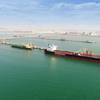The problem in the proposed merger of Japan's three biggest shipping companies (Nippon Yusen, Mitsui O.S.K. Lines and Kawasaki Kisen Kaisha) is, that synergy number looks ambitious - and if it falls short, the players haven't really improved their position much, says Bloomberg.
A business is rarely more than the sum of its parts. That's a problem for anyone hoping that combining Japan's big three container-shipping lines will produce a stronger company and the world's sixth-biggest line.
The joint venture would see savings of more than $1bln a year. With a fleet of 256 container vessels, the proposed business would hold about 7% of the world shipping market.
The promised 110 billion yen in annual synergies -- or 27.5 billion a quarter -- would change things dramatically. But is it achievable - that's the billion dollar question.
The best margin achieved by any of the three Japanese companies' overall operations since the start of 2012 has been 4.3 percent, and the average was 1 percent.
“It feels more of a merger for survival,” Bloomberg quotes Mikey Hsia, a trader at Sunrise Brokers LLP in Hong Kong as saying. “I see it as a reaction to Hanjin Shipping. The impact is that there won’t be any domestic competition. Now, the companies have to compete from a global perspective.”
Currently, all three lines combine container operations that consistently lose money with bulk shipping businesses that (perhaps surprisingly, given the Baltic Dry index's record low earlier this year) mostly make a profit.












